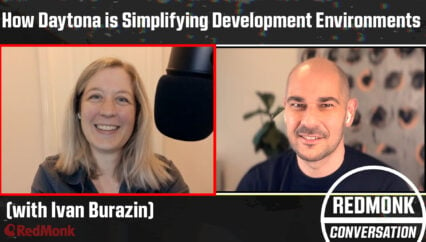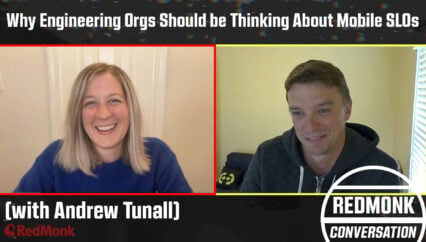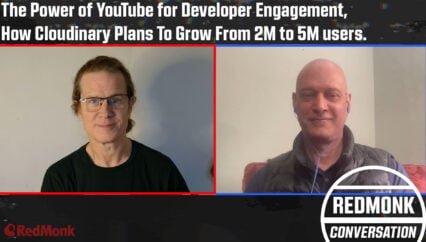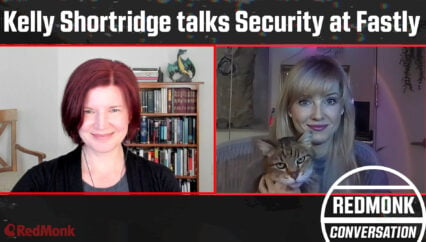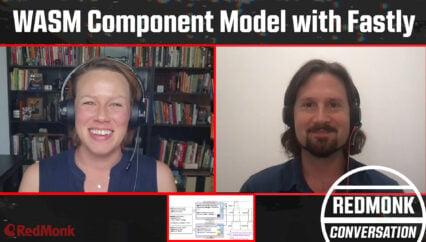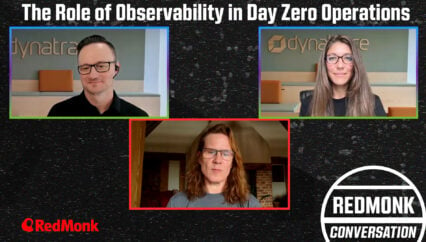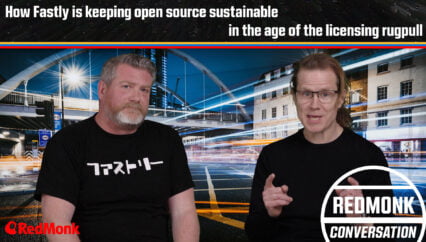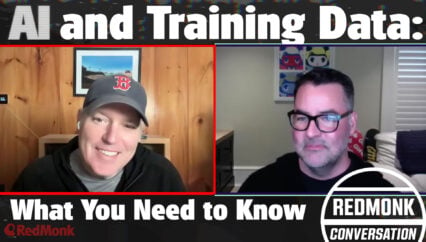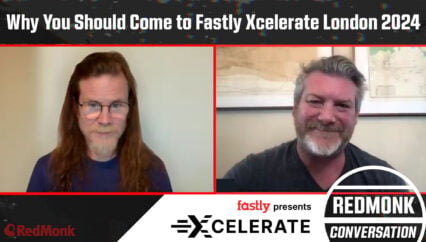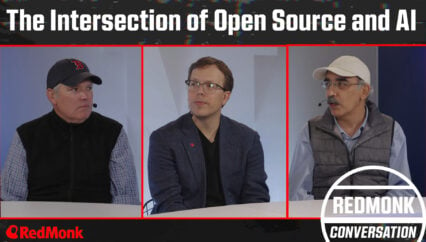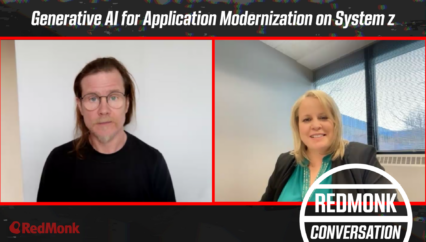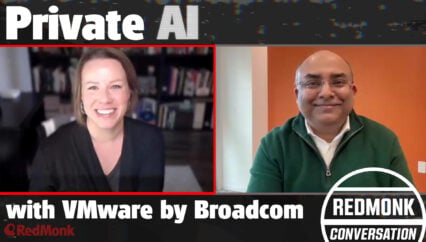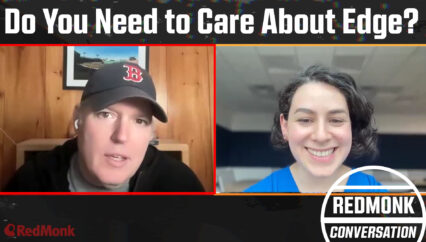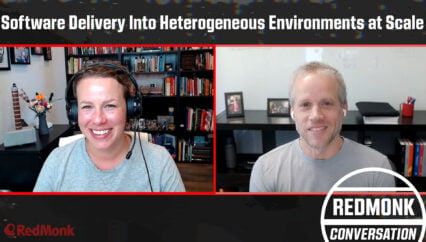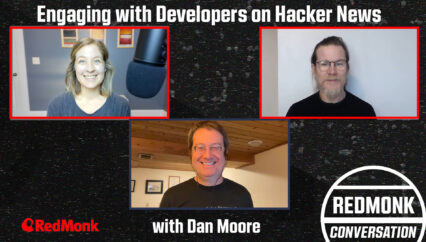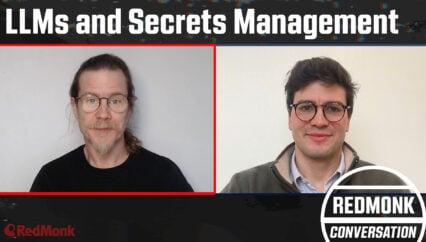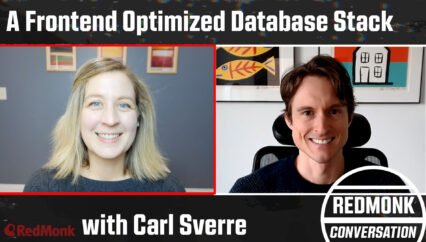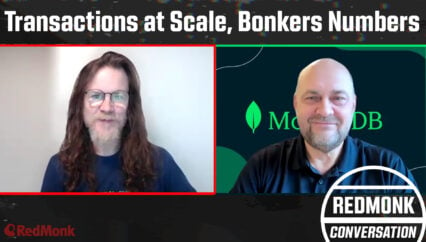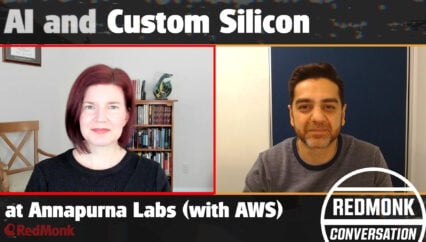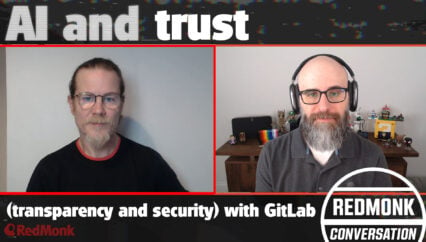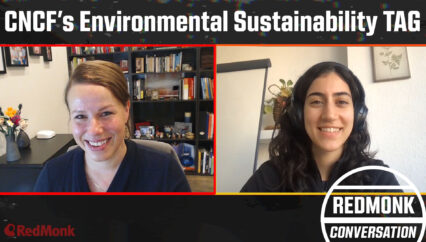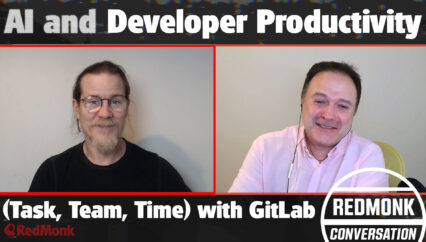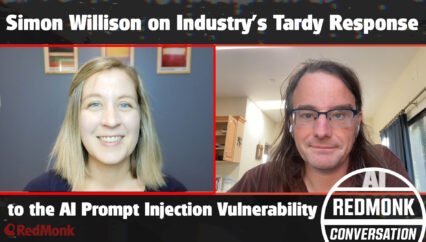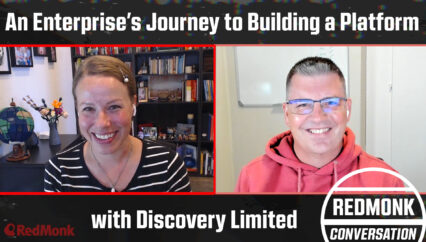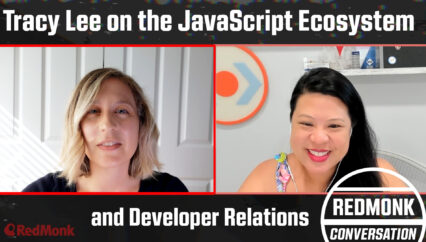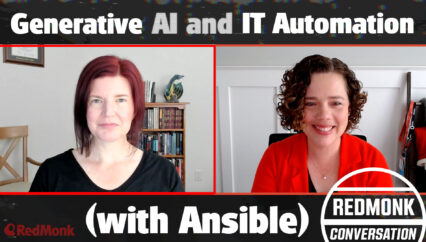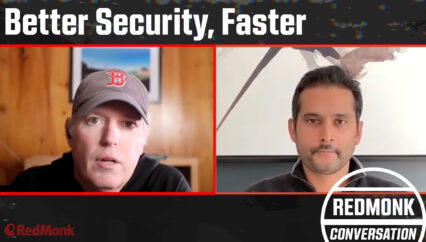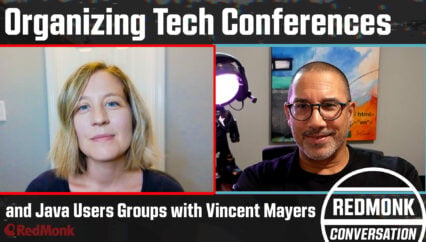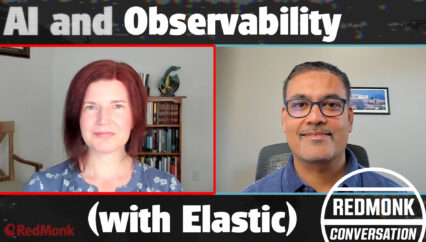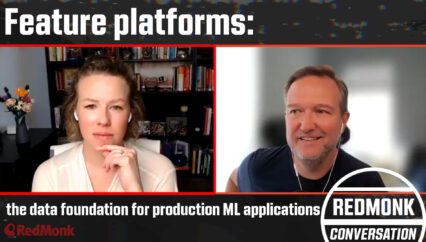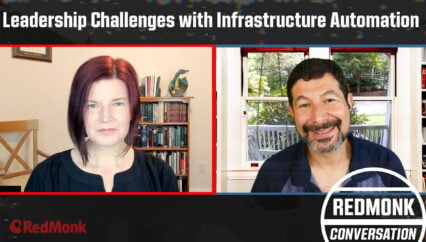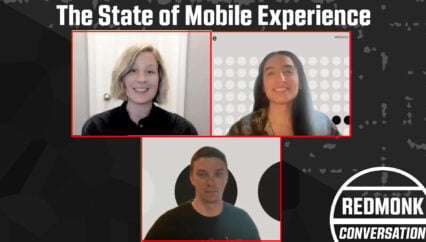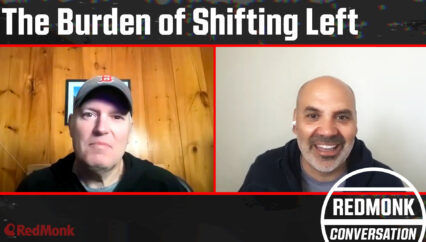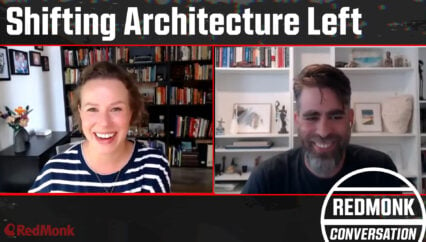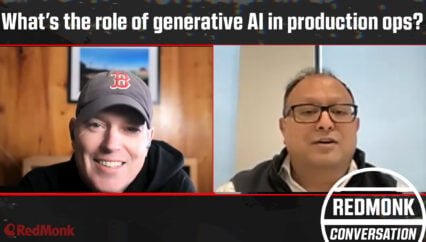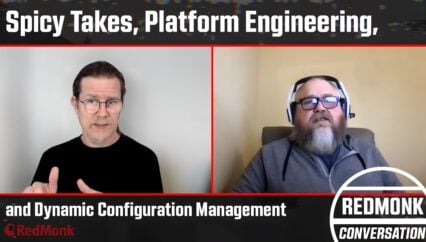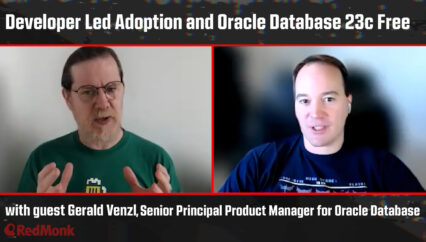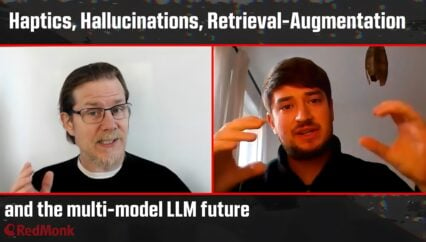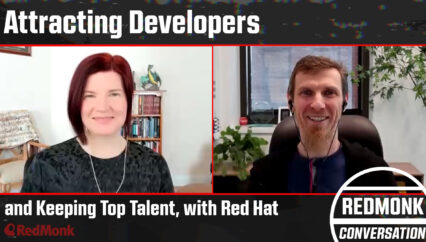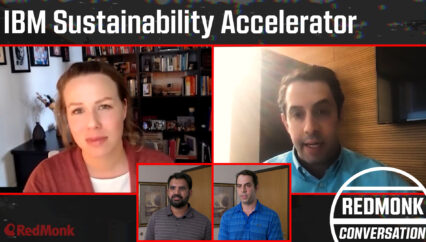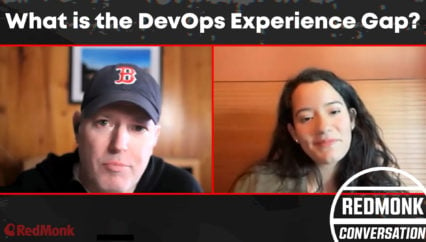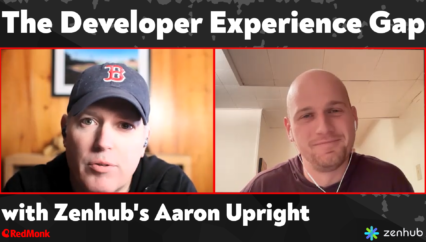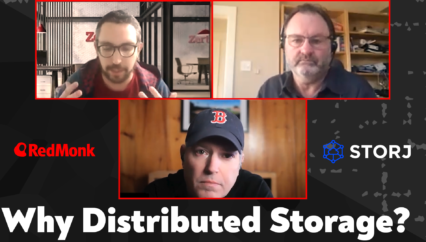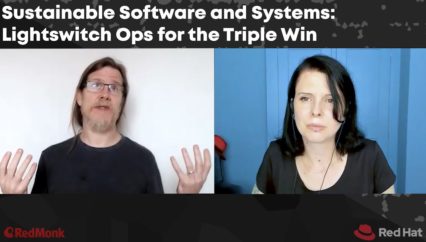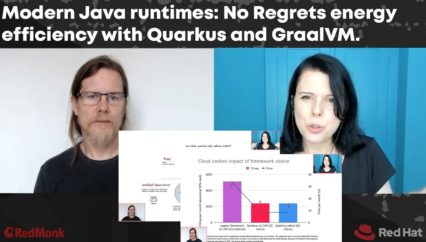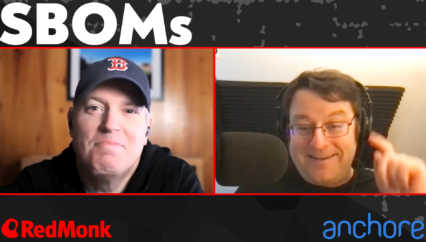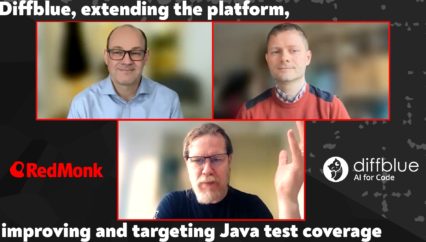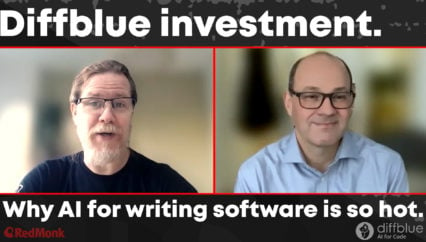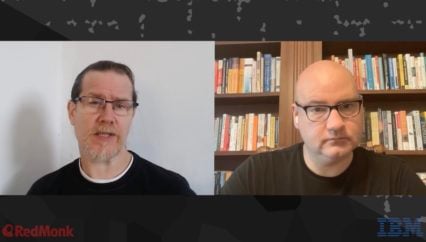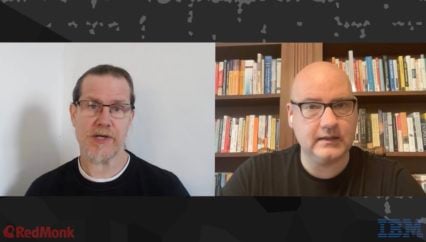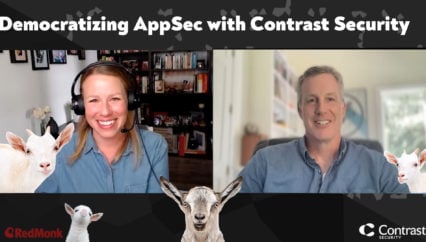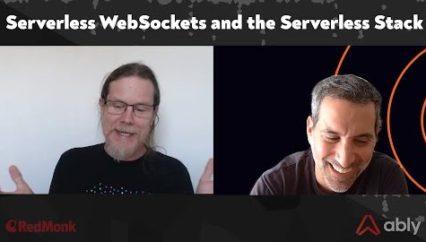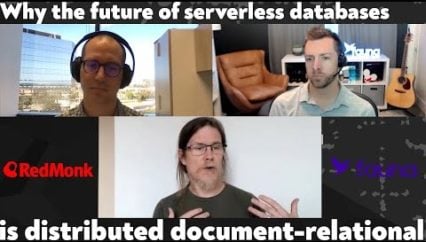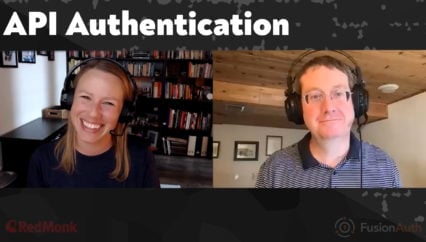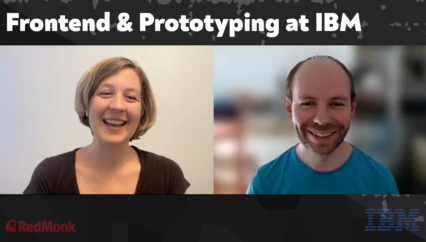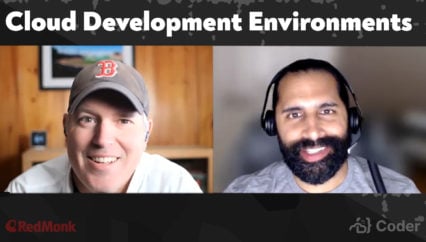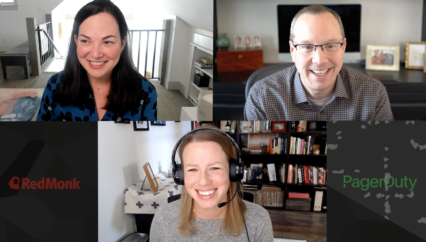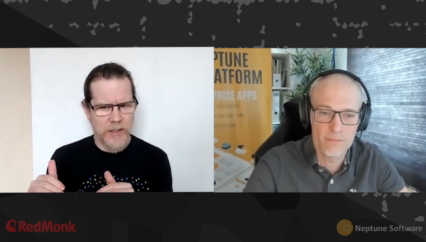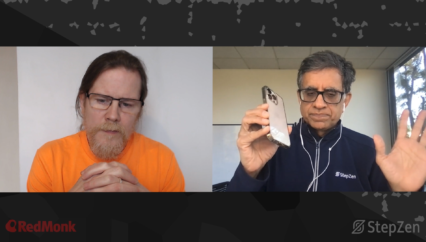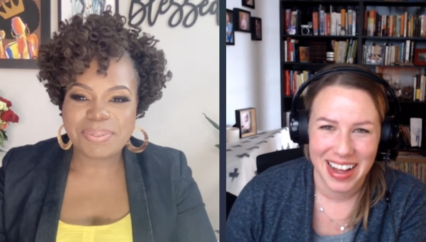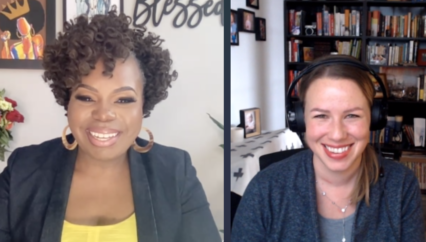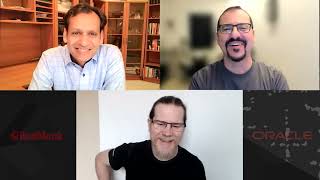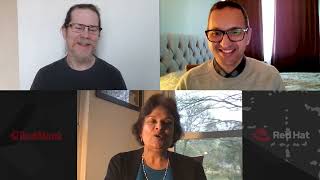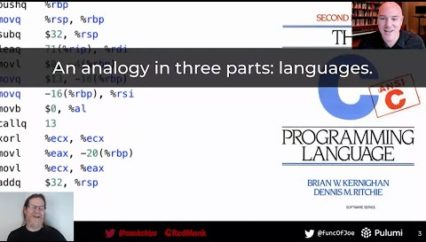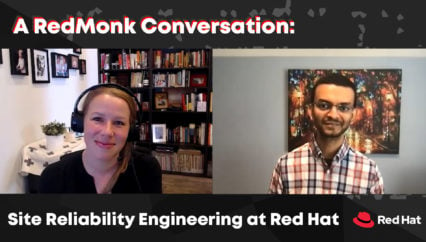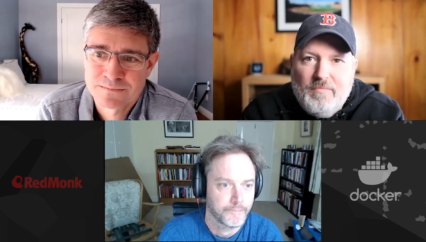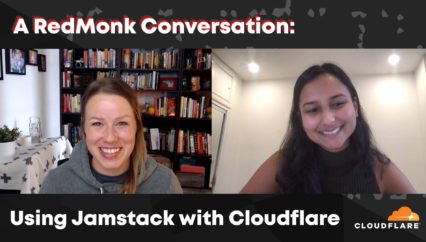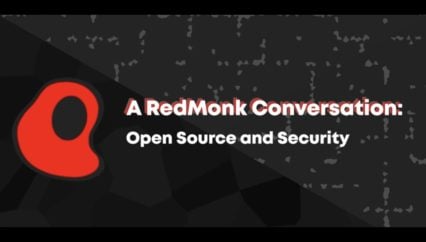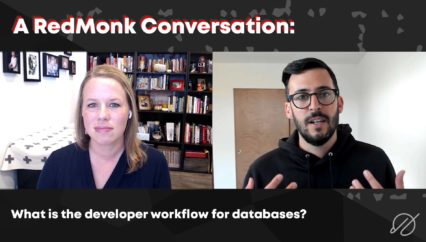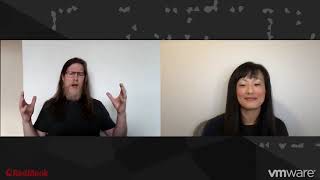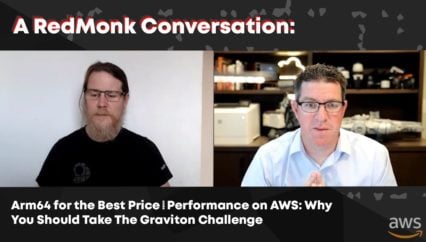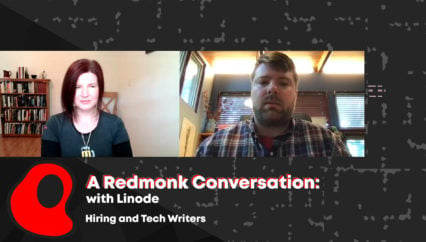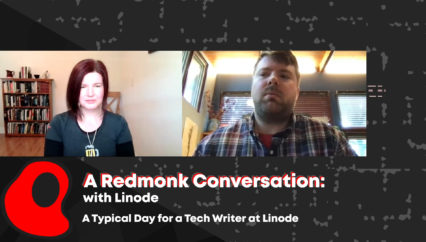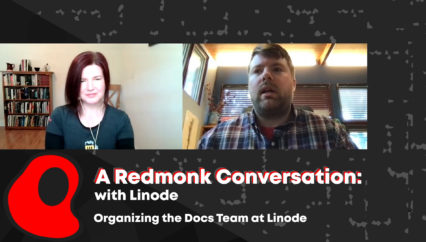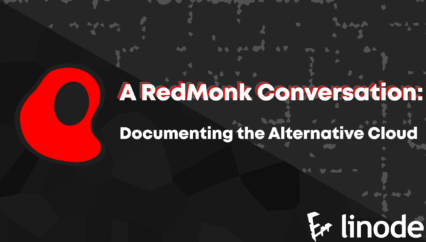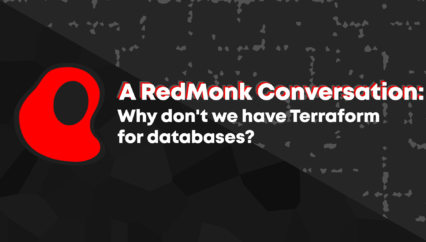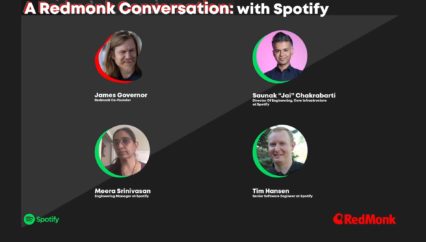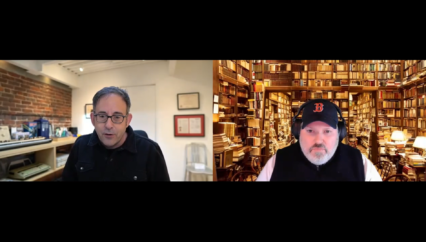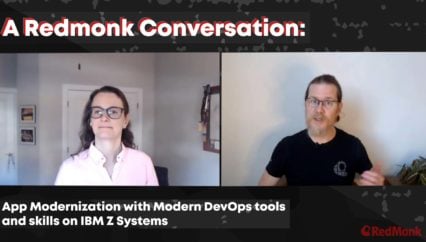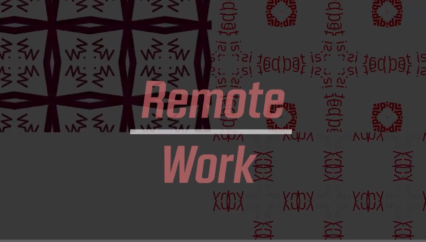In this RedMonk Conversation Kate Holterhoff, senior industry analyst with RedMonk, talks all-things developer certifications with Justin Wheeler, AWS Community Builder, Senior Software Developer at Bravo LT, and developer certification expert. In addition to passing every AWS certification, Justin is also a CNCF Kubernetes and Cloud Native Associate; Google Cloud Certified Cloud Digital Leader; and Oracle Certified Associate. Justin talks about his experience and enthusiasm for certifications, explaining the benefits and pitfalls of these tools for furthering both general tech education and career advancement. Justin weighs in of what study materials and exam prep makes a vendor’s education portfolio successful, and speaks to the role employers should take in supporting continuing education for software engineers.
This was a RedMonk Conversation, not sponsored by any entity.
Find Justin on socials: https://linktr.ee/wheeleruniverse
Rather listen to this conversation as a podcast?
Transcript
Kate Holterhoff: Hello, and thanks for joining me for another RedMonk conversation. My name is Kate Holterhoff, analyst with RedMonk. And with me is Justin Wheeler, AWS Community Builder and Senior Software Developer at Bravo LT. Justin, thank you so much for being here today.
Justin Wheeler: Yeah, no problem. Thanks for having me.
Kate: Yeah, super excited to chat with you. Okay, so I met Justin at a jointly hosted RedMonk and Screaming in the Cloud beers event during re:Invent, and pretty much spent the entire night picking his brain about the state of certifications in 2023. Why, you ask? Because Justin has just so many certifications. Notably for re:Invent, he has every single AWS certification. Unbelievable. So, Justin, before we dig into your certifications and the idea of upskilling more broadly, can you tell us a little about yourself, your education, career, and just what makes you tick?
Justin: Sure thing. Let’s see. I studied game design development in college, but my senior year of college, I decided that that wasn’t the right path for me. So I graduated from that in 2016, and I enrolled in a boot camp for web development and kind of pivoted there. I learned about AWS for the first time in that boot camp, but we didn’t get too hands on with it. I started my first job at Verizon in 2016 as a Java developer, and it was going good. I was hired as a Verizon employee in 2017, and I started getting some opportunities to get AWS certified through Verizon. They have some initiatives there, at least they had at the time to get x number of people certified. So there was some opportunity there and some training resources that they gave me to study. So I started doing that in 2017, and I got my first AWS certification in 2018, and I kind of just kept going with it from there. Ryan Kroonenburg, who’s the CEO and founder of A Cloud Guru, at least he was, said that there was a lot of overlap between the certs and I wanted to continue my learning, but I didn’t really know where to start because of the amount of AWS services was overwhelming.
So I figured it would be a good way to kind of define my learning path through the AWS certifications that were laid out and with so much overlap between the associates, I might as well just keep going. So I continued on that path, and I got three more AWS certs that same year in 2018. And then at the end of the year, I started working with my manager on leading an AWS migration for Verizon from on prem to AWS, and I kept trying to scale up from there. I became a cloud architect at Verizon in 2020. And then I ended up leaving Verizon and joining my current company, Bravo LT, in 2021. In that same year, I also became an AWS community builder, and in 2022 is when I got all twelve or 13 of the AWS certs. I’ve just been continuing my learning ever since then. Right now I’m working with our client Gordon Food Service on their ecommerce platform at Bravo LT, and I’ve been doing that consistently since 2021.
Kate: All right, that helps, I think, kind of lay the foundation of who you are and the vast amount of certifications that you have, but I know you have a few that aren’t AWS certifications. What other certifications do you have?
Justin: Yeah, I don’t have that many that aren’t AWS. I tried to expand into multi cloud as I saw a trend increase there this last couple years, which seems like more and more enterprise companies are looking to multi cloud as a way of avoiding vendor lock in. So I wanted to get skilled up in Azure and GCP as well, since those are the big three. So I got my Azure fundamentals certification and I also got the GCP Cloud Digital Leader certification, and I have a Kubernetes fundamental certification as well. So right now, my current focus for certification is trying to ramp up more on Google Cloud, primarily because the client Gordon Food Service I’m supporting is hosted entirely on Google Cloud and I want to be able to support them better.
Kate: Awesome. And you also have an Oracle certification, correct? For Java?
Justin: Yeah, I do. It was a mandate from the coding boot camp that I went through that everyone gets Java certified to help with the placement there.
Kate: Yeah. Oh, interesting. Okay. Yeah, I’m hoping that we dig into where certifications are mandated and where they are just something that helped you with your own sort of personal mission to become upskilled. Okay, awesome. So I’ve been researching certifications for a while now, but you are really the first person I’ve met who has done the Pokemon thing and sort of caught them all and all being every AWS certification. So as a self identifying completionist myself, I want to first salute you and say, well done. But I wonder what made you want to get every AWS certification, because that’s some, might call it extreme. So what was it that drove you to do it in the first place? When did you realize that you wanted to devote, I can’t even imagine how many hours? They’re not cheap. What drove you to actually do this? To get them all?
Justin: Yeah, for sure. So, like I said in 2018, it started with there was so much overlap across associates, so only like 50% of the content was new and the other 50% was shared across all the exams. So I was studying for all of the associates at the time to kind of just get that solid grounding. And during my studying for the associates, AWS dropped their cloud practitioner, which is the foundational certification, which is supposed to be easier than the associates. But at the time, I already had two associates, so I figured I might as well just take that one as well to see what the difference is. So after that year, I had four of them, and I still wanted to learn more about AWS. I wanted to go deeper, but I didn’t really know where I should focus my learning. And I also didn’t want to fall into the trap of unknown unknowns, if that makes sense. Like, I use the certifications as a verification of my own theoretical understanding, because I can study S3 and I can say I know it, but there might be some features in there that I’m not familiar with or some feature set that I don’t know as well as I think I do.
And you may not know those things if you don’t certify your knowledge, or if you don’t test your knowledge, you might not know what you don’t know if that makes sense. So I just kept going down that path. Database certifications are laid out in a specific way where they have specialty certs that are deep dives into specific topic areas. So I thought that I could learn a lot about those specific areas by studying for the specialty certifications, like advanced networking, machine learning, and data analytics.
Kate: Right. And I’m glad that you frame it in terms of wanting to know more about AWS, because it sounds like that’s a big focus of the AWS certifications, if I’m understanding correctly, is that it teaches you about the services that they provide. Is that correct?
Justin: Yeah, that’s right.
Kate: Okay. So for folks who are — I might be getting ahead of myself, but for folks who are interested in sort of like, gaining the sort of vanilla skills of cloud for instance. Or you know, you talked about the CKA, the Kubernetes skills. If they just wanted to learn, like an open source thing, do you think that certifications, AWS certifications specifically, or maybe any certifications would be a good way to do that? Or are you finding that it’s a little bit more focused on learning all the products available to them and how each of them, all the features that they offer, which might not be obvious just by looking at a dashboard.
Justin: I would say that it depends on the open source technologies that they’re interested in learning about. A lot of AWS services, there are managed versions of a lot of open source technology, like OpenSearch is like a managed version of Elasticsearch, and they have managed Apache workflow for Airflow, which is like a managed version of Airflow. So you can still learn about open source technologies through AWS exams. But I wouldn’t say it’s like the best way to go. I know that there are some certifications for like Prometheus and Grafana from the Cloud Native Computing-
Kate: Foundation? Yeah, the CNCF.
Justin: Yeah, the foundation for the people that host the Kubernetes certifications. That might be better if that’s like what you’re interested in, but I think it just depends. And a lot of the AWS exams are focused on making the best decision for the scenario that’s given. They’ll describe a scenario in great detail and then they’ll ask you to pick the best product or the best solution to that problem or scenario. It’s really testing your knowledge on, do you understand the scenario that is stated? And then which combination of products would best solve the issue? Because it’s rarely going to be one AWS service. It’ll be like a combination of services put together in a specific configuration.
Kate: Wow, okay. And so, it’s never like an open source tool, it’s always like an AWS managed version and other AWS services, correct? So it’s always like across the board within the AWS ecosystem, is that right?
Justin: There are some references to open source or third party tools. I would say the majority of it is focused on AWS services and managed versions.
Kate: Certainly makes sense for the exam and the vendor that’s proctoring it. Okay, awesome. All right. And I do want to take a step back here because I’m imagining that some of our listeners are not familiar with certification. Can you explain a little bit about the process of getting a certification, just like from the beginning? What is it that an aspirant does in order to become certified? Can you walk us through maybe one certification, like maybe becoming an AWS solutions architect, professional or similar?
Justin: Yeah, sure. So whenever I start preparing for an exam, I’ll look on the certification website, because there’s a great detail there on who this exam is built for. The associate and professional certs are role based, so they’re targeted towards someone working in a particular role, like a system administrator, solutions architect, and developer, for example. So they would expect that the person taking the test has years of experience in that role doing that job. And that’s going to be really helpful because there’s some generic just IT knowledge that you need to know because it’s not going to be covered like in their exam guides. They just expect you to know that. So if you’re transitioning from outside of IT background, you need to know the AWS stuff, but you also need to know the IT stuff as well. And every certification has like a landing page that talks about the services that are covered, what’s in scope, what’s out of scope, and has an exam guide and some sample questions. So I would read that and see what are the expectations of this exam? What are they trying to certify that I know? And then if there’s any gaps in my knowledge, then I would try to close those gaps through either AWS training, through skill builder, or third party training through one of the providers, like Pluralsight, A Cloud Guru, Whizlabs.
There’s like 100 or more now. And then just after I closed all the gaps to the best of my ability, then I would just take a couple of practice tests. And after I finished the practice test, I usually go through and I make like online flashcards with the tool called quizlet. You can also do like physical flashcards if you prefer that. For all the questions that I was unsure about, even if I got them right, if I wasn’t sure about any part of the question, any part of the answers, then I would make flashcards to cover that and close those gaps again. It’s kind of like this repetitive cycle that I just keep going over and over again until I’m averaging practice tests about where I expect to be, like above 80%, and I schedule the exam through the proctor’s website and go take the exam.
Kate: Phenomenal. Okay, and who proctors it? I was assuming it was AWS, but do they do it through like Pearson VUE, or do you know who does?
Justin: In the past they use PCI and Pearson VUE, but now it’s only Pearson VUE.
Kate: Interesting. Okay. Okay. Yes, I have one certification, and it was with Pearson VUE, it was through Microsoft. So I know that they’re kind of a big vendor in that space. Have you ever done a certification in real life? Have you ever had to go to like a testing center?
Justin: Yeah, that’s actually my preferred method of testing.
Kate: Tell me about that.
Justin: My office is normally very chaotic, so taking online tests has never been like an easy process because they like to make sure your workspace is all cleaned out. So I need like a couple of hours to clean up my office before I can test. I have multiple monitors configured and they don’t like that. So I need to disconnect my monitors and replace them. And I’m kind of like a fidgety guy, I think. So without knowing, I can’t stop from moving. You might have caught me, like, twisting in my chair or curling my fingers. And proctors do not like that. They don’t like you to be active or moving around while taking a test. Right. So what I’ve had a lot of success with is I’ll schedule a test for a specific day, and then with my employer’s permission, I’ll take a couple of hours off of work, like 4 hours. I’ll do the test early in the morning, and I’ll have this ritual where on the morning of a test, I’ll cram all the exam tips. And then I make sure I get a lot of sleep. I’ll drink like nothing but water, but not a lot because I don’t want to go to the bathroom during my test.
And then I’d take like a very peaceful drive over to the testing facility. It seems to be getting farther and farther. I think with COVID there’s been less and less testing centers, so I’ve had to drive like 30, 45 minutes away to take a test. But I take like 4 hours off work, so it isn’t that huge of an inconvenience. But I get there. I just feel better. I feel more comfortable. I’m in their space. They know with a higher level of certainty that I’m not cheating. I don’t have to worry about Internet connectivity issues or the software doesn’t work on my computer. I’ve seen that happen a lot with people I’ve talked to where they try to take an online test. It doesn’t work with their computer, it doesn’t work with their software or their Internet, or they’ll get, like, someone will barge in during the test and then they get flagged or they fail or something like that. I have two little kids with me, so they’re very unpredictable and they’re very loud at times. So I like to be away and have the peace and quiet. But I’ve done both. My Kubernetes fundamentals certification was online because online was the only option to take it. But I always prefer in person if I can.
Kate: That’s awesome. I have heard tell of the desire for more in person testing for a lot of the reasons that you’re articulating here. So, yeah, I appreciate hearing it from someone who has done it so many times because, yeah, just the one that I did. I had the same sort of anxieties, and frankly, my MacBook, the webcam, did not pair well with whatever Pearson’s VUE software is that takes over your entire computer in order to make sure that you’re not cheating. So. Yeah, I totally get that, but I don’t think it was an option for the exam I took, although I know with COVID, yeah, options are limited.
So you had mentioned your employer being rad and giving you 4 hours off to take these exams. I’m sure that benefits them, but, I mean, I am curious about the relationship of your jobs. It sounds like you’ve — so it was Verizon first and then your most recent place of employment, Bravo. So they obviously are excited when you know more, because that helps them, I would think. But can you talk to me about any other sort of accommodations or ways that they’ve kind of pushed you into getting certifications?
We talk a lot about partner programs as being a sort of motivation for employers to get their workforce certified. How is upskilling kind of played into your work life? What is that relationship like?
Justin: Yeah. Okay. So it was kind of different experience at both. At Verizon, they had some initiatives. I don’t know if they were registered as an AWS partner or not. I didn’t know that much about the partner program at the time, but we have these internal boot camps of people that were AWS certified trying to get other employees AWS certified, and they had paid for yearly subscriptions to services like A Cloud Guru and Pluralsight that we could use at no cost to us to get this training. And they reimburse certification exams if you passed. And they also, through the boot camp, awarded, I think it was one voucher per year per employee. So you could even take the test without having to pay out of pocket, pass or fail. So that was really cool. That was a lot of the benefits that I got from Verizon. And after I got a couple of my certs, I even ended up leading some of those boot camp classes to get other people certified as well. So that was a lot of fun, and it helped me to solidify my understanding, because when you teach something to someone, then you can find more gaps in your knowledge that you didn’t know you had.
But after I joined Bravo, I already had a majority of the certs, but they’ve been very open, and they have reimbursed all the certs for all the exams that I passed, so I still have that. They’ve been very understanding with, like, if I see a certification that I want to go for. I haven’t had any issues getting their blessing to go train for it and sit the exam and then get them reimbursed. I will say a lot of my training is independent, and I do a lot of my training off hours. So I’m not asking constantly for time off work to train or upskill. I’ve kind of built that into my daily routine where every day I have a little bit time set aside to learn, and I’ve been doing that consistently for the last couple of years.
Kate: How much time per week would you say that you spend studying?
Justin: I think it varies a lot depending on my workload and my life, with my kids being so little. But I would say it’s anywhere from maybe 2 hours if I’m not very busy, to 20 plus hours if I’m really determined.
Kate: Whoa! I mean even 2 hours a week is not nothing. Wow, that’s amazing.
Justin: I was recently cramming for the AWS data engineer associate beta, and I spent several hours every day studying for that. Even though I already knew a lot of the material, I wanted to close those gaps that I knew I had in some of the services that weren’t covered in the other exams or some of the newer services that I haven’t looked at in the last couple of years. Like formation is one of the newer ones.
Kate: Okay, so from your vantage as a practitioner, what would you say makes a certification good? You’ve taken a range. Clearly you have the most experience with AWS, but I’m thinking of all the components that make up a vendor’s education portfolio. So we’ve got the study materials, we’ve got the practice tests, we’ve got the exam itself, that whole experience. So what qualities should these resources have in order to make an exceptional experience for you as the test taker and the exam recipient, or, sorry, the certification recipient?
Justin: Okay. Yeah, for sure. I think trying to limit the scope of the exam is very important. Some of these exams, I’ll look at the exam guide, and it’s like four or five pages long because there’s so many services that are in scope for the exam. But when I sit the exam, I don’t see a majority of them on there because they can’t fit content for every question, for every service in the question set. Right? So I know they run different versions of the test and someone else might get those services, but I didn’t get them. Maybe a smaller scope would help. So you’re not learning ten things when you only need to know, like five of them to pass. If that makes sense. So I think that that could be important. And some of the exams are very good about this and some of them are less good about it. For example, the Solution Architect Professional, I think, is very broad. It could cover, theoretically every AWS service except for the ones that are less than six months old, because you won’t see any service on a test if it’s less than six months old, because that’s like their testing update cycle.
But there’s over 200 services, so that’s a lot to study for, even if you may only see one question from some obscure service like ground station, which controls satellites, or bracket, which is their quantum service, for example. But I still wanted to learn them because they could come up and I’m interested in learning everything I can, so.
Kate: Right. You are unique in that way.
Justin: Yeah. The practice tests are interesting. I never thought that the AWS practice tests were very good. They’re improving with skill builder now, but it was kind of like the real exam where it would tell you pass or fail, but it wouldn’t tell you which questions you got wrong. So it’s not very helpful from a studying perspective because you have to kind of think every question you’re unsure about, you have to study again because you don’t know which ones you missed. And they kind of break it down into like a domain map. So they’ll say like, you missed like two questions in this domain, two questions in this domain example like that. But it could be hard to tell which question falls into which domain because they’re not labeled. And if a question is composed of multiple services that are across multiple domains, it could be difficult to tell what domain that question really falls under. So there’s some vendors that are much better at this for practice tests like A Cloud Guru and Whizlabs. I use Whizlabs a lot for practice tests, primarily because they have a bunch of different variants that you can take.
So you can have take multiple tests and they’re all different. Like the tests are completely different, which is really nice with A Cloud Guru, they have one test, but it’s similar to the real exam where it swaps the answers. So they have a question bank of like 150, and you’ll get like 65 random questions out of that same bank. So you can get different questions, but a lot of the questions will be recycled depending on how many times you take the test. So the Whizlabs has them split out. But I try to take both because in my experience, A Cloud Guru’s tests are much more accurate than Whizlabs’ are. Or maybe they’re quicker to update them? I’m not sure, but the practice tests are pretty important. Otherwise, you don’t know where you stand until you take the real exam. And that can be very expensive if you just use that as a gauge because they’re pretty pricey.
Kate: Right.
Justin: And then the exam itself, again with the scope, I don’t think it should go too broad. And then I’ve seen a lot of questions where answers that are very similar, where you need to know very minor differences, and they’re almost overly wordy, where 90% of the words and the answers are duplicate in every answer. So you just need to kind of know the 10% of the answer that’s not duplicate before you can compare them. I think they do that to kind of trip you up. I don’t like that. I don’t like the words that are like — the questions that are designed to be tricky, just to be tricky. They’re not testing your understanding of database services at that point. They’re testing your understanding of the english language and the way that the question is written in a very specific way, which can be even harder for people that aren’t english native speaking. I know they have other language exams, but I’ve never taken one of them, so I don’t know how well they translate. So I don’t like those type of questions on the exam either.
Kate: This is excellent feedback. And, yeah, I think what I’m getting from speaking with you is you are very good at taking tests. You’d have to be. Because you don’t necessarily need to share this if you don’t want to. But my understanding is that folks usually fail these exams at least once before they pass them. And so, yeah, learning how to take them well is like… But I don’t know. I don’t want to go with percentages here, but it’s a huge part of being successful as someone who wants to get certified from these different vendors and in these different skill sets.
Justin: Yeah, for sure. And especially with the specialty and the professional certs, there’s a lot of reading involved. These scenarios they throw at you could be three paragraphs long, where it just goes on and on and on about everything you need to know. And the details that you need to pay attention to can be so minor, but show up all throughout the questions, and then the answers can be a paragraph long each as well. So you have 3 hours for those exams to take it. I think they’re 85 questions, if I remember right.
Kate: Wow.
Justin: So it can be a lot of reading, and I know people who take tests differently. I’m fortunate that I think I do take tests well. I really enjoy tests. And I don’t try to double think myself because I either know the question or I don’t know it. I’m not going to sit there and rack my brain on something that I’m not sure about. So I’ll just give my best guess if I’m not sure and I’ll keep going. And unlike a lot of people, I don’t go back through my questions later and check the answers because I don’t want to second guess myself. So I give my best guess or I know the answer and I’ll go with that answer and then I don’t go back at all. I think that helped me with the time. I’ve never had an issue where I ran out of time with an exam. I just read the question carefully, scan for those keywords and I actually read it multiple times, probably if it’s a tricky question, to try to make sure exactly what they’re asking. Because a lot of times with AWS service choice, it’s a trade off. It’s always going to be a trade off between two or more things.
So for one solution, it could be like option A if it’s performance based, but if it’s cost based, and it could be like option B. So they’re both valid choices, but it depends on what the customer is trying to achieve, really.
Kate: Yeah. So very few people self identify as someone who loves taking tests. Do you think that kind of bleeds out into other parts of your life? Like, what makes you a natural test taker? You said that you studied game design. Do you think it relates at all to your interest in gaming? Yeah. Just tell me more about being someone who loves tests.
Justin: I’m not sure. It’s really hard to tell.
Kate: Okay.
Justin: I actually lost interest in gaming. I don’t know if it’s related to game design school or not, but I don’t really play games anymore. I think now that the time I spent gaming is time I could spend learning, so I just try to learn more. And it’s a really good feeling for me when I’m taking a test and I know the answers. Like, if I know all the answers in a row, I might get giddy or start smiling and test proctors don’t like that either. But it’s a good feeling when you’ve been studying for six months and you’ve answered the last 20 questions for 100% certainty. That’s right. I know for sure I got those ones right. It’s just a good feeling, I think.
Kate: I love this. This is phenomenal. Okay. I love it. I love the endorphins that you get from knowing all the answers. That’s awesome. Yeah, I can empathize. I’ve never been there in that situation of like, I am so ready to take this multiple choice test. I’m so into this, but I want the vision of you smiling at your monitor just to stay with me. This warms my heart.
Okay, so let’s talk about how certifications have changed. So you’ve been getting them, you said you got your first one in what, 2016? Is that right?
Justin: Yeah, I got my Java Oracle certified associate for Java 7 in 2016.
Kate: Okay, so you’ve seen some things at this point. Can you talk at all about how the certification landscape has changed? Because when I’ve been researching this and talking to vendors who create these certification programs, they talk a lot about how much the pandemic affected, not only the way that we do a lot more virtual testing, but also just like the content of these exams. So what have you seen? Have you seen things shift since the pandemic or just since 2016?
Justin: Yeah, like you mentioned, I stated earlier, I’ve seen a heavier push for online testing. It seems like less testing centers are available, maybe because staffing issues, I’m not sure, but they’re pushing you to use their online software and their online platforms. I think it’s more convenient for the proctors to do that than it is for you to put them in a location, you can go there. I’ve seen a lot of colocation testing centers where it’s not dedicated to the testing center itself. It’s like I’ll go to a college and I’ll take a test there because they already have facilities for stuff like that. So I’ve seen that a lot recently. Actually, this beta exam I just took this month was at a college. And as far as the content changing, I’ve seen too with the multiple choice exams, there’s a lot of doubt as the value there. So there’s been more push to kind of introduce labs or more hands on, on these exams, which I think is great if they can implement it properly. Like the Kubernetes exams that I mentioned earlier are entirely hands on. So those are much harder to study for because you have to get hands on. It’s not theoretical, but they can provide, or appear to provide more value because they are hands on exams.
Kate: Right? Yeah. I mean, it certainly reflects what I’m hearing that hiring managers want. I guess we can talk a little bit about the sort of elephant in the room, which is a lot of folks are, they think that certifications aren’t going to get them a job. So if someone’s trying to reskill from one industry into tech specifically, since that’s the kind of certification we’re talking about, they’re told that getting a certification will do that. But the stereotype is that, and frankly, anecdotal conversations have confirmed this in my experience, but that hiring managers don’t find certifications to be good evidence for possessing the skills necessary to fulfill the role of a developer, that it just doesn’t seem to have the same sort of cachet that maybe having a diploma would have, or having a long experience with actually creating projects. So are labs going to fix this issue? Can it fix it? Or what’s your thoughts on that?
Maybe, let me phrase it this way, what advice would you give to someone who has been told that they should reskill by way of certifications?
Justin: Right. So I have seen that as well. In my experience, people will try to get certified and then they try to use that to get a job. So they don’t have like a formal computer science background. I mean, neither do I, but it’s not enough, especially with the AWS certifications being multiple choice. A lot of it is there to verify your theoretical understanding, but they care more about the hands on the practical applications than they do about the theoretical, if that makes sense. So even if you’re not employed, I would suggest that you can get the certification if you want, but it’s a lot easier to get certified when you have an employer backing and covering those expenses for you. So I’m not sure if it makes sense to study on your own for the test and then actually wait until you’re employed to get the tests or get the certifications. But try to get hands on with whatever you’re learning about whatever you want to do, then get hands on with it. You can build like side projects and you can write blog posts about that stuff. And I’ve done that a lot. And I saw A Cloud Guru and Pluralsight were pushing people to do that as well with their cloud guru challenge that Forrest had started at A Cloud Guru to get people to build these things themselves, write blog posts about it and share about it on LinkedIn, because then you’re getting the practical experience as well.
And you can talk about that in a job interview. And you may not have the formal enterprise experience, but if you have any hand on experience, that’s better than none. And it’ll go a lot further than a certification itself would.
Kate: All right. I think that’s very fair advice and certainly seems to reflect what I’m hearing as well. So we’re about out of time. Before we go, how can folks hear more from you? Justin? Do you use social media? Can they connect with you on any platforms?
Justin: Yeah, I’m very active in the community. Like I said earlier, I’m a AWS community builder. I’m very active on LinkedIn, and I try to write blogs. I don’t write as many as I wish I did, so I’m trying to do more about that. But my social handle is @wheeleruniverse everywhere, and I have, like, a link tree, and I can share out all that stuff, too.
Kate: Fantastic. Okay, well, we’ll be sure to include that in the show notes. And I want to thank Justin for chatting with me about all things certifications today. Again, my name is Kate Holterhoff, analyst with RedMonk. If you enjoyed this conversation, please, like, subscribe and review the MonkCast on your podcast, platform of choice. If you are watching us on YouTube, please, like, subscribe and engage with us in the comments. And with that, thank you.
